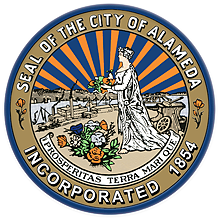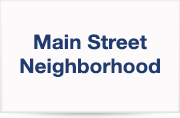Main Street Neighborhood Specific Plan:
On March 21, 2017, the City Council unanimously approved the Main Street Neighborhood Specific Plan which was a necessary first step before any new development could occur in the Main Street Neighborhood as required by the Zoning Amendment. Approval of the Plan was a major leap forward towards the rebuilding of the Main Street Neighborhood and specifically the supportive housing facilities of the Alameda Point Collaborative, Building Futures for Women and Children, and Operation Dignity (the Collaborating Partners).
The Main Street Neighborhood Plan (MSN) fulfills the General Plan policy objectives for a transit-oriented mixed-use, mixed income neighborhood with diverse housing options, parks and open spaces, neighborhood serving businesses and transitional commercial uses. The MSN Plan implements the vision through a variety of regulations, standards, and guidelines for both public improvements and private investment. The MSN Plan is available on line at: https://alamedaca.gov/alameda-point/final-planning-documents.
The three major characteristics of the MSN Plan are:
I. Parks and Central Gardens: The MSN Plan establishes the Central Gardens as the center of the MSN Plan area, connecting a network of small parks and serving as the main gathering spaces for the different areas within the Plan area and reinforcing an agricultural identity already in existence.
II. Multi-Modal Network: The MSN Plan builds upon and continues the extensive planning work of the MIP and Town Center Plan to develop a balanced and comprehensive multi-modal transportation network for people walking, cycling, taking transit, and driving in the neighborhood.
III. Form Based Regulations: The MSN Plan provides specific regulations, standards, and design guidelines to shape the form of the public and private physical environment and the use of the land to create a transit-friendly, mixed-use neighborhood that is inclusive of a range of incomes and housing types, including 25% affordable housing to address households in the range of 60 to 120% Area Median Income (AMI) and requires that at least 10%“workforce housing” for every new development to address households in the range of 120 to 180% AMI.
Main Street Supportive Housing Rebuilding Program:
The Collaborating Partners existing leased campus consists of mostly old Navy buildings spread across 34 acres. In 2013, the Navy transferred ownership to the City of 510 acres of Alameda Point including the areas under a long-term lease by the supportive housing community. The Rebuilding the Existing Supportive Housing (RESHAP) project will consolidate the campus to a smaller 10+ acre footprint, allowing the Collaborating Partners to own their own property with state-of-the-art facilities.
The City and the Collaborating Partners, along with their developer, Mid-Pen Housing, a highly regarded and experienced non-profit affordable housing developer have entered into an Exclusive Negotiate Agreement (ENA) and have begun DDA negotiations and working on a Development Plan. The Development Plan is based on an extensive outreach process among the residents of the supportive housing community including over 600 comments on the preferred housing types and ideas for neighborhood design.
The Collaborating Partners:
Alameda Point Collaborative (APC) was formed in 1999 to help families and individuals break the cycle of homelessness and poverty. APC now provides over 350 formerly homeless residents, including 200 children and youth, with the safety and stability of a place to call home. All residents will continue to have access to life and job skills training and substance abuse and mental health counseling provided by a team of highly skilled professionals. APC is the largest supportive housing provider for homeless families in Alameda County and its wide range of services give residents the tools they need for long-term success. Residents work with on-site case managers and counselors to break down barriers to stability. Adults in the community may participate in APC’s workforce development program and take advantage of one of APC’s on-the-job training opportunities.
Building Futures for Women and Children (BFWC) was founded in 1988 and provides a continuum of care, resources, programs, and services to help Alameda County residents build futures free from homelessness and family violence. BFWC currently provides 52 units of permanent housing at Bessie Coleman Court located at Alameda Point. Services provided to the community include a 24-hour crisis line, a domestic violence outreach program providing support groups, and individual support and resources. Its Housing Resource Center provides case management and housing assistance to help individuals and families avert homelessness or become quickly rehoused after becoming homeless.
Operation Dignity (OD) was founded in 1993 and assists homeless veterans and their families by providing emergency, transitional, and permanent housing and mobile outreach for homeless veterans in Alameda County. At Alameda Point, OD currently provides a mix of permanent supportive housing and transitional housing in 28 units at Dignity Commons. OD offers housing and employment search support, nutritious meals, veteran peer support, assistance accessing VA and other benefits, and connections to physical and mental health care. OD’s goal is to help veterans rediscover hope and provide the tools needed to live a self-sufficient and stable life.
Contact Information:
For more information on the project, please contact Michelle Giles at mgiles@alamedaca.gov






